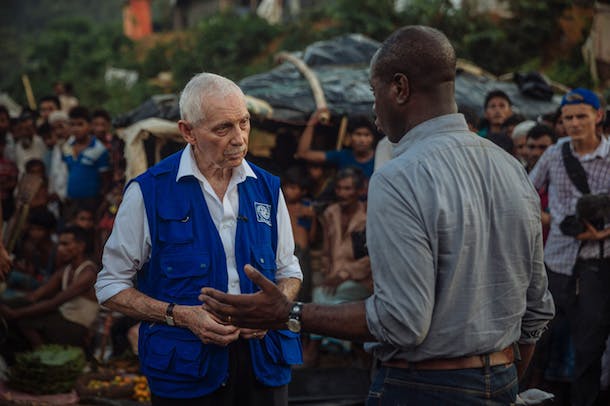As part of our “Americans in the UN” project to share the stories of Americans who work for the United Nations, we connected with Director General of the International Organization for Migration (IOM) Ambassador William Lacy Swing. At IOM, Director General Swing is working to address the growing needs of over 80 million people in 50 countries.
Formerly a U.S. Ambassador and Under-Secretary-General for the UN Organization Stabilization Mission in the Democratic Republic of the Congo (MONUSCO), Director General Swing is one of three Americans who currently lead a UN agency.
Originally from Lexington, North Carolina, Director General Swing received his Bachelor of Arts from Catawba College, his Bachelor of Divinity from Yale University, and holds an honorary degree from Hofstra University.
Watch the interview:
What motivates you to work for the UN?
Director General Swing: You know, after my retirement from 40 years of bilateral diplomacy, I had my first opportunity to do multilateral diplomacy, and the UN gave me that opportunity. I went into peacekeeping and had the opportunity to see the good work that the UN does in this field, which I think is indispensable. It’s actually a great value: The UN can do peacekeeping at about half the price of doing it bilaterally, so I was motivated. But my whole life has been about public service, and when I retired I thought, “What do I do to serve?” This opportunity came along, and I was so grateful that it did. I have moved on from peacekeeping now into migration.
From your experience, what is an example of how the UN has made a difference in someone’s life?
Director General Swing: Well, of course there are multiple examples. One that jumps out to me is the question of the elections that were held in the Democratic Republic of the Congo in 2006. Now, we’ll set aside what’s happened since those elections, but the elections were free and fair, judged to be so by all institutions, including the Carter Center. It’s interesting that people who had never voted before, who couldn’t read, they could take a ballot as big as the front section of the New York Times, and on page seven check exactly which name they wanted to vote for. For me that was inspiring, and I think it did show that these people for once had a real opportunity to state their views on the policies.
How did you first learn about the UN?
Director General Swing: Oh, that goes back to my boyhood. It was founded in 1945. I was a student in high school when the UN more or less was founded, and I thought, “Boy, here is an interesting concept that rather than doing it nation by nation, we’ll do it all together.” Later, of course, I came to know the UN first-hand through my work at the State Department as a career diplomat. Then I came to know about it first-hand through the peacekeeping that I did, and now, of course, through the very important field of migration.
What is your message to Americans about the importance of the UN?
Director General Swing: My message is very simple: If the United Nations did not exist we would have to create it. Thank goodness we have it. We’re now 72 years into the UN’s activities, and while one can always criticize and say, “Well, they could do better” or “They could do it for less money” or “There’s a bureaucracy” and all of that, ultimately, what you have is an organization in all of its multiplicity – specialized agencies, those doing food, those doing children, those involved in peacekeeping. But it’s all necessary work, and much of this work is done actually at a lower cost than you could do it if you tried to do it bilaterally or among a couple of countries. So, the message is, we need the United Nations.
What is the favorite part of your job?
Director General Swing: I think there’s no question about it, my proudest achievement was taking part in the decision by the member states to enter the UN system. We’re very proud of that and I think it has greatly strengthened the organization and offers it a much brighter future than it would have had, had we stayed outside.
JOIN US: “Are you an American interested in supporting the UN? Sign up for updates from our sister organization, the Better World Campaign, for opportunities to take action.”

